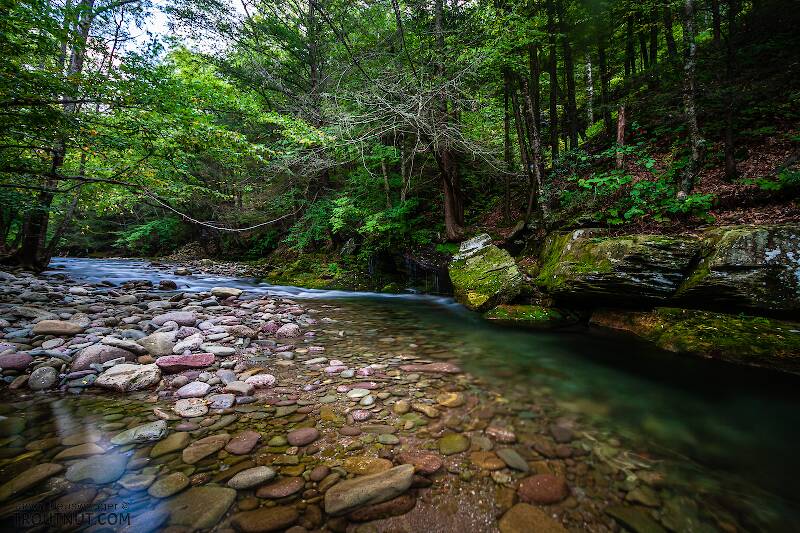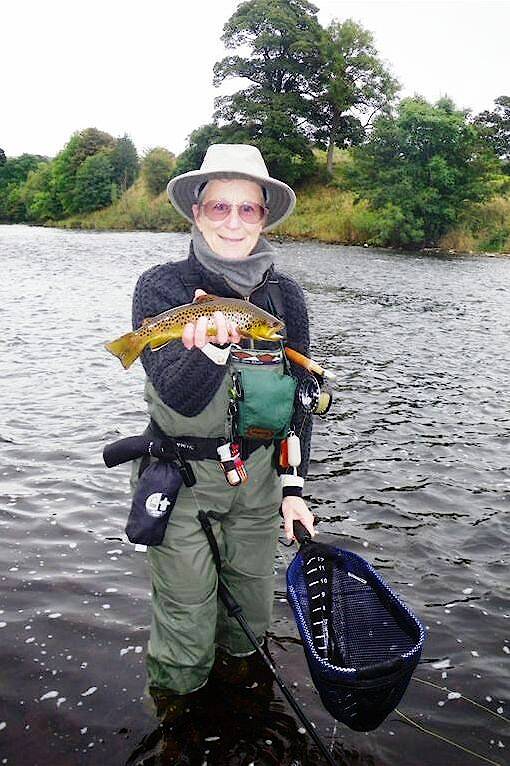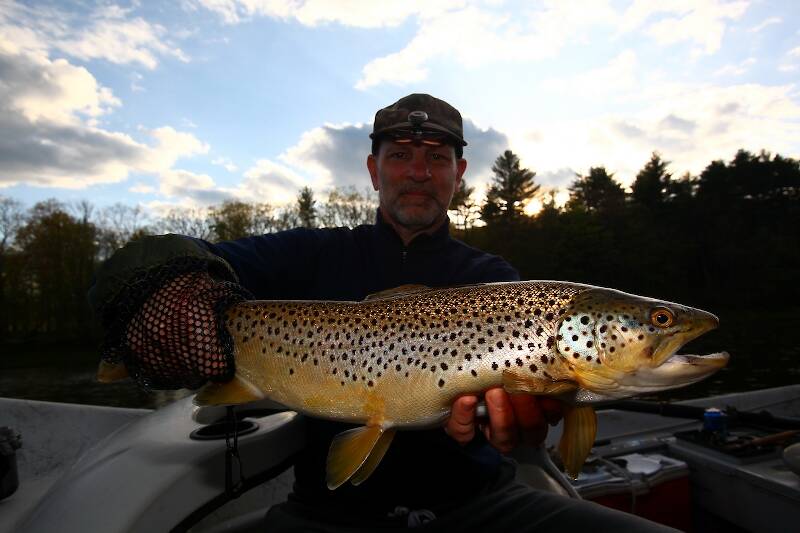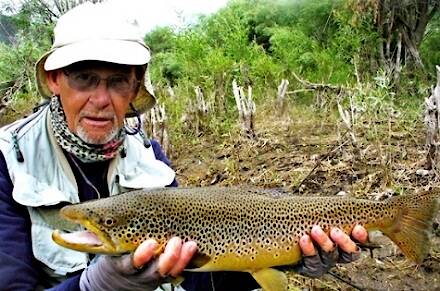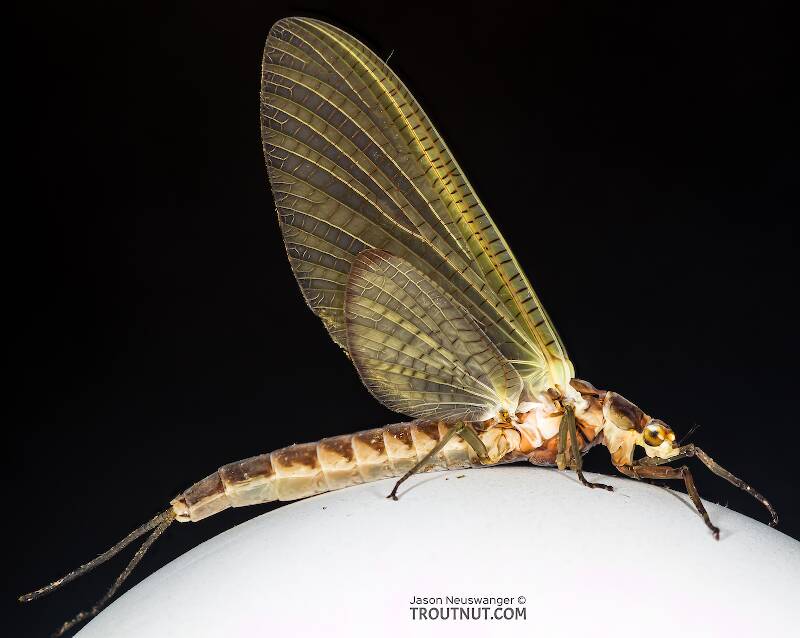
Hex Mayflies
Hexagenia limbata
The famous nocturnal Hex hatch of the Midwest (and a few other lucky locations) stirs to the surface mythically large brown trout that only touch streamers for the rest of the year.
Featured on the forum
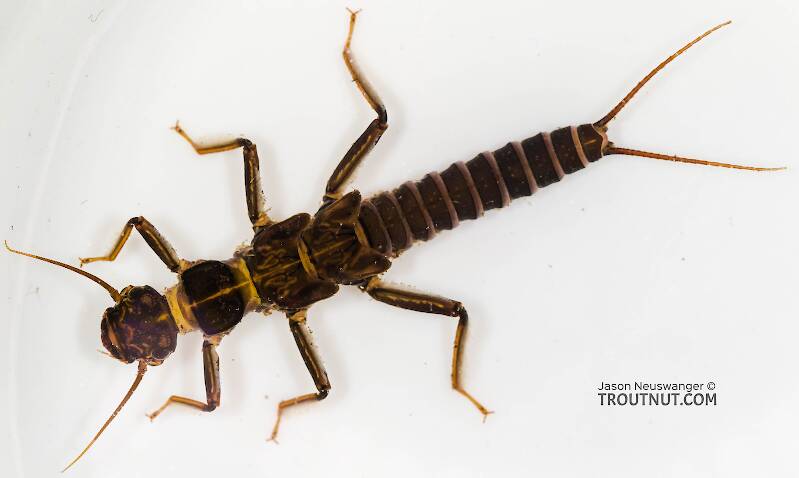
As far as I can tell, this species has only previously been reported from one site in Oregon along the Columbia gorge. However, the key characteristics are fairly unmistakable in all except for one minor detail:
— 4 small yellow spots on frons visible in photos
— Narrow occipital spinule row curves forward (but doesn’t quite meet on stem of ecdysial suture, as it's supposed to in this species)
— Short spinules on anterior margin of front legs
— Short rposterior row of blunt spinules on abdominal tergae, rather than elongated spinules dorsally
I caught several of these mature nymphs in the fishless, tiny headwaters of a creek high in the Wenatchee Mountains.
— 4 small yellow spots on frons visible in photos
— Narrow occipital spinule row curves forward (but doesn’t quite meet on stem of ecdysial suture, as it's supposed to in this species)
— Short spinules on anterior margin of front legs
— Short rposterior row of blunt spinules on abdominal tergae, rather than elongated spinules dorsally
I caught several of these mature nymphs in the fishless, tiny headwaters of a creek high in the Wenatchee Mountains.

Troutnut is a project started in 2003 by salmonid ecologist Jason "Troutnut" Neuswanger to help anglers and
fly tyers unabashedly embrace the entomological side of the sport. Learn more about Troutnut or
support the project for an enhanced experience here.
CaseyP on Aug 24, 2007August 24th, 2007, 3:45 pm EDT
there is a lot of good advice on this board about getting rods for low prices, and some about reels that don't break the bank, but what about lines? i'm faced with replacing a line that came with a nifty outfit only because the line is BRIGHT ORANGE! all the reasons for that color bounce off my delicate sensibilities. i just can't stand it. my trusty local fly shop carries Scientific Anglers lines that are very good, but they cost 60 bucks or more. for a new reel, that makes sense for me, because i need backing, as well as knots i never tie and don't trust. but just because the color is offensive...?
does anyone make/sell a line that is less expensive that you would trust with the Best Fish You Ever Hooked? do they slide through the guides with that seductive rattle of a truly slick new SA or Orvis? do they float like a mayfly? do they have as poor a memory as i?
does anyone make/sell a line that is less expensive that you would trust with the Best Fish You Ever Hooked? do they slide through the guides with that seductive rattle of a truly slick new SA or Orvis? do they float like a mayfly? do they have as poor a memory as i?
"You can observe a lot by watching." Yogi Berra
Shawnny3 on Aug 24, 2007August 24th, 2007, 4:28 pm EDT
Cortland lines are a solid alternative to the more expensive ones, but I'm also a bit partial to Cortland stuff because I grew up near Cortland. I am also so cheap that I hardly ever buy flylines, so you might want to go with the opinion of others who are chronic equipment tinkerers.
I had a Cortland sink-tip line snap on me in the middle of a cast one time (it was probably my fault, because I'm pretty rough on my equipment). I sent the thing back to them and they sent me a new one completely free of charge. Good people. I've never had any other trouble with a Cortland line, although the cheaper ones, as is true I suppose of any brand, tend to have more memory problems.
I think the line I have on currently is 444, and it's served me well for many years.
-Shawn
P.S. I've also heard that lines last much longer and cast much better if you wash them every time you use them, store them in cool places, keep them from freezing in the winter, etc., but I'm too lazy to verify any of that for myself. The way I see it is, until my casting is poetic enough for my flyline to be the weakest link, I'm not going to worry about it.
I had a Cortland sink-tip line snap on me in the middle of a cast one time (it was probably my fault, because I'm pretty rough on my equipment). I sent the thing back to them and they sent me a new one completely free of charge. Good people. I've never had any other trouble with a Cortland line, although the cheaper ones, as is true I suppose of any brand, tend to have more memory problems.
I think the line I have on currently is 444, and it's served me well for many years.
-Shawn
P.S. I've also heard that lines last much longer and cast much better if you wash them every time you use them, store them in cool places, keep them from freezing in the winter, etc., but I'm too lazy to verify any of that for myself. The way I see it is, until my casting is poetic enough for my flyline to be the weakest link, I'm not going to worry about it.
Jewelry-Quality Artistic Salmon Flies, by Shawn Davis
www.davisflydesigns.com
www.davisflydesigns.com
Shawnny3 on Aug 24, 2007August 24th, 2007, 4:34 pm EDT
By the way, I know the orange line is aesthetically awful, but it can work as a great strike indicator (especially if you put some black bands on it with a Sharpie). Lefty Kreh, a pretty good fly presenter I've heard, recommends focusing more on line weight than color when presenting to spooky fish. He would prefer, for example, a 3-weight orange line on a 4-weight rod than a 4-weight transparent line on the same rod. He's convinced that it's the impact of the line on the water that spooks fish, not the color, and he's done enough testing of this theory to be pretty strongly convinced of it.
I know that's not really what you were referring to, Casey, but I thought I'd throw it out there, anyway.
-Shawn
I know that's not really what you were referring to, Casey, but I thought I'd throw it out there, anyway.
-Shawn
Jewelry-Quality Artistic Salmon Flies, by Shawn Davis
www.davisflydesigns.com
www.davisflydesigns.com
RleeP on Aug 24, 2007August 24th, 2007, 4:44 pm EDT
Here's what I think and I'm really not trying to be flip...
Get some Rit in a shade that pleases you and dye the line in a very warm, but not super hot bath (somewhat cooler than the recomended temp, whatever it is, I don't recall. This is done mostly for religious reason based upon the assumption that very hot water might damage the line, although I do not know this for certain). I've done this a number of times and it has worked pretty well. It can be a little tricky to get full coverage unless you do a good deal of stirring. My first attempt ended up with a line that was blotched with the dye color overlaid on the original shade. It still cast ok though...
I got into doing this when I drove nearly 300 miles to fish in Iowa once and found upon arrival that I had forgotten my reel. I had everything else, so I went down to Wallyworld and bought an $8 Shakespeare reel and a $10 Canadian made WF5F. It turned out the line (which was white) was the floating and shooting equal of any $40 line I've owned. So, I went back and bought 3 more and, once back home, dyed them to suit me, including one I did in Blue Denim, just because I'd always wanted a fly line with that stone-washed look....:)
But the long and the short of it is that it works or at least seems to, as I have 100 hours or so on one of the lines and none of the color has come off yet.
I'll bet a nice dark brown over that orange would come out a stunning burnt umber...:)
Oh, I don't think Wallyworld is handling the Canadian lines any more. I've looked at a bunch of stores and no luck. Too bad, they were a deal.
Get some Rit in a shade that pleases you and dye the line in a very warm, but not super hot bath (somewhat cooler than the recomended temp, whatever it is, I don't recall. This is done mostly for religious reason based upon the assumption that very hot water might damage the line, although I do not know this for certain). I've done this a number of times and it has worked pretty well. It can be a little tricky to get full coverage unless you do a good deal of stirring. My first attempt ended up with a line that was blotched with the dye color overlaid on the original shade. It still cast ok though...
I got into doing this when I drove nearly 300 miles to fish in Iowa once and found upon arrival that I had forgotten my reel. I had everything else, so I went down to Wallyworld and bought an $8 Shakespeare reel and a $10 Canadian made WF5F. It turned out the line (which was white) was the floating and shooting equal of any $40 line I've owned. So, I went back and bought 3 more and, once back home, dyed them to suit me, including one I did in Blue Denim, just because I'd always wanted a fly line with that stone-washed look....:)
But the long and the short of it is that it works or at least seems to, as I have 100 hours or so on one of the lines and none of the color has come off yet.
I'll bet a nice dark brown over that orange would come out a stunning burnt umber...:)
Oh, I don't think Wallyworld is handling the Canadian lines any more. I've looked at a bunch of stores and no luck. Too bad, they were a deal.
Martinlf on Aug 25, 2007August 25th, 2007, 5:14 am EDT
I've heard that New Zeland guides make their clients dye their lines olive sometimes. Sierra Trading Post has some great deals on fly lines from time to time, and rods too. In fact their whole fly fishing inventory, which varies a lot from time to time, can offer some great bargains.
"He spread them a yard and a half. 'And every one that got away is this big.'"
--Fred Chappell
--Fred Chappell
CaseyP on Aug 25, 2007August 25th, 2007, 7:22 am EDT
now who would have thought the answer was so simple? thanks a lot, Lee, for letting me in on the secret to really good color in fly lines. i suppose i could keep the last foot out of the color bath for a strike indicator. perhaps blotchy would have its advantages too.
but you want to know the real reason i don't like florescent lines? i hate it when my cast winds up on the water in a mess and the whole world gets to see it.
Shawn, you and Lefty have to be right about the splash of a heavy line: that's why i have a three weight outfit that works harder than anything else i fish in the East. dual taper grey line meant i never saw the line the first few months i fished it but neither did the fish. it had never ever occurred to me to put the lighter line on a longer heavier rod; oh, the possibilities become endless...:-)
oh, yeah, Louis, Sierra does do lines, and if you're after something exotic, go there first. learned a lot just reading about how many different ones there are. did wonder a bit if they're really all different...can't say i can really recommend the leaders and tippet, though; some of it behaved as if it had been baked a bit somewhere along the line. of course, they will take it back.
but you want to know the real reason i don't like florescent lines? i hate it when my cast winds up on the water in a mess and the whole world gets to see it.
Shawn, you and Lefty have to be right about the splash of a heavy line: that's why i have a three weight outfit that works harder than anything else i fish in the East. dual taper grey line meant i never saw the line the first few months i fished it but neither did the fish. it had never ever occurred to me to put the lighter line on a longer heavier rod; oh, the possibilities become endless...:-)
oh, yeah, Louis, Sierra does do lines, and if you're after something exotic, go there first. learned a lot just reading about how many different ones there are. did wonder a bit if they're really all different...can't say i can really recommend the leaders and tippet, though; some of it behaved as if it had been baked a bit somewhere along the line. of course, they will take it back.
"You can observe a lot by watching." Yogi Berra
Wbranch on Aug 25, 2007August 25th, 2007, 1:25 pm EDT
Same reply as for low cost rods - check out Orvis Sale items at their web site also check out sierratradingpost.com.
Catskill fly fisher for fifty-five years.
Wbranch on Aug 25, 2007August 25th, 2007, 1:26 pm EDT
Same reply as for low cost rods - check out Orvis Sale items at their web site also check out sierratradingpost.com. Do a google search for discount fly lines.
Catskill fly fisher for fifty-five years.
Softhackle on Aug 27, 2007August 27th, 2007, 6:33 am EDT
Hi Casey,
If you are in the market for fly line, give this place a look. They often have very good deals on lines.
Mark
http://stores.ebay.com/Adams-Outlet-Fly-Fishing
PS, I'm also partial to Cortland lines.
If you are in the market for fly line, give this place a look. They often have very good deals on lines.
Mark
http://stores.ebay.com/Adams-Outlet-Fly-Fishing
PS, I'm also partial to Cortland lines.
"I have the highest respect for the skilled wet-fly fisherman, as he has mastered an art of very great difficulty." Edward R. Hewitt
Flymphs, Soft-hackles and Spiders: http://www.troutnut.com/libstudio/FS&S/index.html
Flymphs, Soft-hackles and Spiders: http://www.troutnut.com/libstudio/FS&S/index.html
CaseyP on Sep 16, 2007September 16th, 2007, 4:06 pm EDT
Lee, i finally got the dye and the line in the same room, and whaddayno! i now have an amazing navy-blue line with orange strike indicator tip. was careful not to use really hot water, and on Tuesday i'll get to try in on the Little J, God willing. the texture seems identical on the dyed and undyed parts.
"You can observe a lot by watching." Yogi Berra
Shawnny3 on Sep 17, 2007September 17th, 2007, 8:26 am EDT
Thanks for sharing your results, Casey. Did you just dip-dye to avoid getting dye on the tip? I like to put bands on my line every so often to act as indicators, so I was curious if anyone (RleeP?) has tried coating small sections with Vaseline or something to keep the dye off certain parts during dyeing.
-Shawn
-Shawn
Jewelry-Quality Artistic Salmon Flies, by Shawn Davis
www.davisflydesigns.com
www.davisflydesigns.com
CaseyP on Sep 17, 2007September 17th, 2007, 11:08 am EDT
i put the dye in hot water in a large plastic wash basin in the sink, and then unreeled the line into the dye, except for the front and back ends. i left it for a couple of hours. the dye was really too dark, so the orange became dark navy blue. next time i'll know that the dye readily colors the line, even though it's got all sorts of plastics in it, so it might be possible to come up with some really invisible combinations.
"You can observe a lot by watching." Yogi Berra
Martinlf on Sep 18, 2007September 18th, 2007, 6:38 am EDT
Shawn, would electrical tape strips work?
"He spread them a yard and a half. 'And every one that got away is this big.'"
--Fred Chappell
--Fred Chappell
Shawnny3 on Sep 18, 2007September 18th, 2007, 11:44 am EDT
I was thinking the same thing, Louis. I don't know - you'd have to get it completely watertight. If you could do it, it would be a lot better than some compound that would wipe right off.
I was hoping someone had tried some of these things.
-Shawn
I was hoping someone had tried some of these things.
-Shawn
Jewelry-Quality Artistic Salmon Flies, by Shawn Davis
www.davisflydesigns.com
www.davisflydesigns.com
CaseyP on Sep 18, 2007September 18th, 2007, 1:56 pm EDT
okay, took the line out on the water today. it changed color as it got wet to a most handsome rich mahogany brown. good thing i left two feet of indicator--the thing was flat out invisible. it cast just fine, and behaved as normal. when i dried it off at home with a paper towel, i noticed a little bit of dye on the paper, so i guess it isn't entirely permanent, but it will be a long time before it will be bright orange again.
i think it would be worth trying to dye a line with vaseline on the stripes you wanted to keep as bright indicators. batik dye is also done by tying up very tightly the bits you want to keep free of dye so the dye water won't penetrate. maybe fine mono? might scar the line, though.
or could you just use a sharpie to make black stripes? that lasts and lasts.
i think it would be worth trying to dye a line with vaseline on the stripes you wanted to keep as bright indicators. batik dye is also done by tying up very tightly the bits you want to keep free of dye so the dye water won't penetrate. maybe fine mono? might scar the line, though.
or could you just use a sharpie to make black stripes? that lasts and lasts.
"You can observe a lot by watching." Yogi Berra
Shawnny3 on Sep 19, 2007September 19th, 2007, 12:20 am EDT
Thanks, Casey, for the update. There are many types of dyes, so you may just need to read up a little on them to figure out which would be best for your flyline. In particular, most traditional flytying and clothing dyes (like the RIT you bought) are for natural materials, whereas your flyline is synthetic. So a different approach may be needed to get consistent results with flyline.
As for the line being nearly invisible, remember that what's invisible to you is not necessarily so to the fish. Floating line is viewed by fish from below, and is therefore seen by the fish against the background of the sky or perhaps the trees. That's probably why herons are the color of the sky - good camo when you make your living hunting fish from above. So maybe a grey-blue would be the best base color for flyline. But I doubt it matters much in most situations as long as the line is the right weight and the leader is the right length.
-Shawn
As for the line being nearly invisible, remember that what's invisible to you is not necessarily so to the fish. Floating line is viewed by fish from below, and is therefore seen by the fish against the background of the sky or perhaps the trees. That's probably why herons are the color of the sky - good camo when you make your living hunting fish from above. So maybe a grey-blue would be the best base color for flyline. But I doubt it matters much in most situations as long as the line is the right weight and the leader is the right length.
-Shawn
Jewelry-Quality Artistic Salmon Flies, by Shawn Davis
www.davisflydesigns.com
www.davisflydesigns.com
RleeP on Sep 19, 2007September 19th, 2007, 2:21 am EDT
Hi fellas..
I see the experiments continue..:)
Casey: I'm glad it seems to have worked for you. I really like my stone-washed blue denim line...:) I have no idea as to how absolutely permanent this Rit thing is, but so far on the lines I have dyed, leaching seems to be about negligible.
Shawn: I've not tried dying sections and masking others. This is one of the reasons though that I like sharing ideas in forums like these. There are always creative and innovative folks who will sail the idea beyond the known waters. And as a result, we all benefit.
I see the experiments continue..:)
Casey: I'm glad it seems to have worked for you. I really like my stone-washed blue denim line...:) I have no idea as to how absolutely permanent this Rit thing is, but so far on the lines I have dyed, leaching seems to be about negligible.
Shawn: I've not tried dying sections and masking others. This is one of the reasons though that I like sharing ideas in forums like these. There are always creative and innovative folks who will sail the idea beyond the known waters. And as a result, we all benefit.
CaseyP on Sep 19, 2007September 19th, 2007, 9:47 am EDT
yep, Shawn, i'm off to the fabric store to find something to work with my bright yellow 4 wt line. as i remember 4th grade art class, yellow and blue and red are the primary colors, and green and orange and purple are the secondaries. now to turn yellow more blue, whaddaya think of green?
when underwater myself (don't ask!) i noticed that line on the water has no color; it just leaves a long dimple in the mirror surface. however, i do think the line should match the surroundings more, like sagey green or pale blue or destert tan, so that when it moves over the water it will be harder to see.
there was a thread on trout vision around here somewhere--anyone remember when/where?
when underwater myself (don't ask!) i noticed that line on the water has no color; it just leaves a long dimple in the mirror surface. however, i do think the line should match the surroundings more, like sagey green or pale blue or destert tan, so that when it moves over the water it will be harder to see.
there was a thread on trout vision around here somewhere--anyone remember when/where?
"You can observe a lot by watching." Yogi Berra
Shawnny3 on Sep 19, 2007September 19th, 2007, 10:26 am EDT
Yeah, RleeP, I get so many crazy ideas in my head sometimes I can't keep up. I never expect any of them to work very well, which makes it a nice surprise when one turns out to be pretty good.
And, Casey, I think your observation about line color is exactly what I'd suspected - it's the silhouette that is most noticeable to the fish, the line being backlit by the sky, and color is secondary.
A few other dyeing considerations to keep in mind:
1) Mixing dye colors is something you should never do. Instead, overdye to achieve mixes. A word of caution - this is very hard to do consistently. It is not as simple as 1 part red and 1 part yellow give you a medium orange. It can be more like 1 part red and 5 parts yellow give you a medium orange. So experimentation is necessary. Also, there is the matter of which color to start with, the darker or the lighter color, when overdyeing. I've been told by an experienced dyer that he likes to start with the dark color and then work backwards from it and lighten it up afterwards. I don't have enough experience to give you great advice along these lines (too bad Invicta's not around right now - I'm sure he's done a lot of dyeing), but I know that every variable must be considered carefully to achieve desirable and consistent results. Flyline's not cheap, so you might want to experiment with some old line and perfect the process before you dye a new line.
2) RIT dyes are pretty safe, but other dyes (and mordants) are toxic to varying degrees. You should consider both your own safety and the environmental impact of their use before you jump too far into dyeing. Just be careful and responsible. With natural substrates, if you do dyeing right you will end up with consistently good results AND have very little excess dye that goes down the drain. But the only way to get to that point is practice, practice, practice. Also, keep copious notes (very much like a lab notebook, since essentially labwork is what you are doing) and you will improve your results and lessen your adverse environmental impact.
I've been doing a little of my own dyeing only when I can't purchase materials in the color I want. Michael Radencich's book, Tying the Classic Salmon Fly, is a solid reference but perhaps more involved than your average fisherman requires. I've also purchase A.K. Best's book, Dyeing Natural Flytying Materials, and was pretty unimpressed. It's a decent book for someone just interested in learning simple recipes for various drab colors often used in practical tying, but it is short on expertise and is basically limited to fabric-store dyes. If you are serious about dyeing, I'd definitely look elsewhere. Radencich just came out with another book exclusively about salmon-fly materials, but I don't know if it gets into dyeing or not. It's one of those books I really want but can't afford right now.
-Shawn
And, Casey, I think your observation about line color is exactly what I'd suspected - it's the silhouette that is most noticeable to the fish, the line being backlit by the sky, and color is secondary.
A few other dyeing considerations to keep in mind:
1) Mixing dye colors is something you should never do. Instead, overdye to achieve mixes. A word of caution - this is very hard to do consistently. It is not as simple as 1 part red and 1 part yellow give you a medium orange. It can be more like 1 part red and 5 parts yellow give you a medium orange. So experimentation is necessary. Also, there is the matter of which color to start with, the darker or the lighter color, when overdyeing. I've been told by an experienced dyer that he likes to start with the dark color and then work backwards from it and lighten it up afterwards. I don't have enough experience to give you great advice along these lines (too bad Invicta's not around right now - I'm sure he's done a lot of dyeing), but I know that every variable must be considered carefully to achieve desirable and consistent results. Flyline's not cheap, so you might want to experiment with some old line and perfect the process before you dye a new line.
2) RIT dyes are pretty safe, but other dyes (and mordants) are toxic to varying degrees. You should consider both your own safety and the environmental impact of their use before you jump too far into dyeing. Just be careful and responsible. With natural substrates, if you do dyeing right you will end up with consistently good results AND have very little excess dye that goes down the drain. But the only way to get to that point is practice, practice, practice. Also, keep copious notes (very much like a lab notebook, since essentially labwork is what you are doing) and you will improve your results and lessen your adverse environmental impact.
I've been doing a little of my own dyeing only when I can't purchase materials in the color I want. Michael Radencich's book, Tying the Classic Salmon Fly, is a solid reference but perhaps more involved than your average fisherman requires. I've also purchase A.K. Best's book, Dyeing Natural Flytying Materials, and was pretty unimpressed. It's a decent book for someone just interested in learning simple recipes for various drab colors often used in practical tying, but it is short on expertise and is basically limited to fabric-store dyes. If you are serious about dyeing, I'd definitely look elsewhere. Radencich just came out with another book exclusively about salmon-fly materials, but I don't know if it gets into dyeing or not. It's one of those books I really want but can't afford right now.
-Shawn
Jewelry-Quality Artistic Salmon Flies, by Shawn Davis
www.davisflydesigns.com
www.davisflydesigns.com
CaseyP on Sep 19, 2007September 19th, 2007, 10:32 am EDT
found the trout vision thread:
http://www.troutnut.com/topic/463
http://www.troutnut.com/topic/463
"You can observe a lot by watching." Yogi Berra
Quick Reply
Related Discussions
Topic
Replies
Last Reply
2
May 17, 2018
by Subway
by Subway

